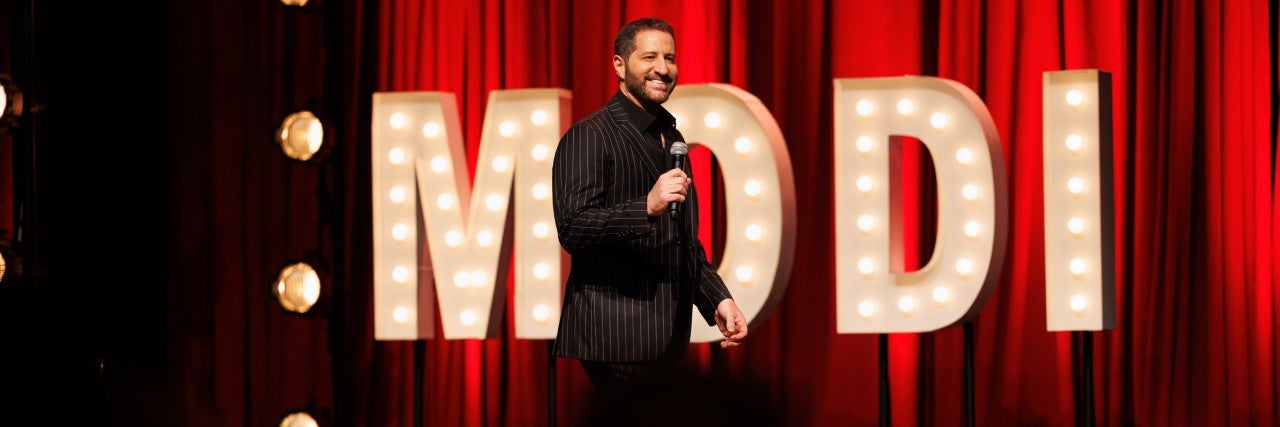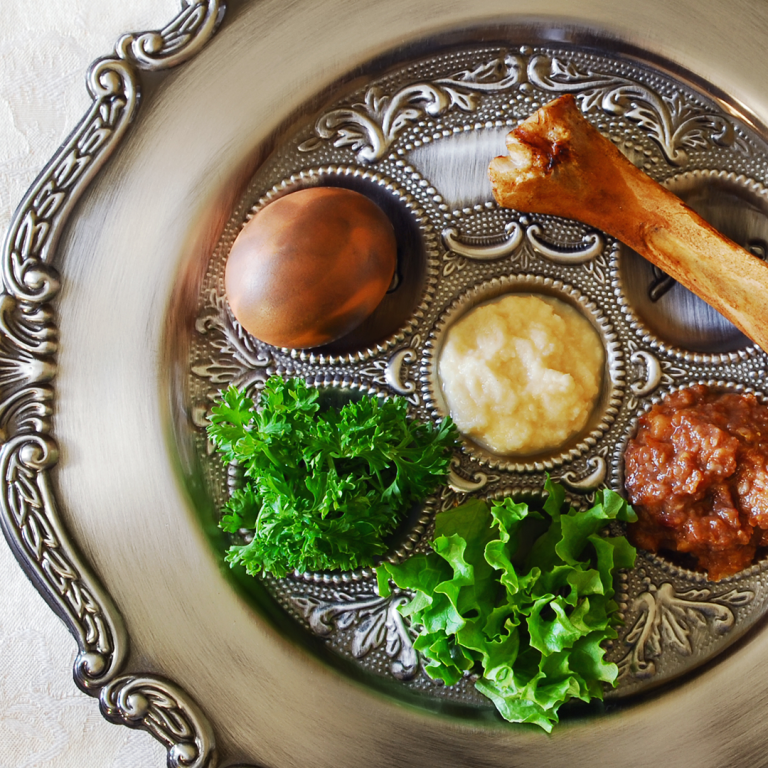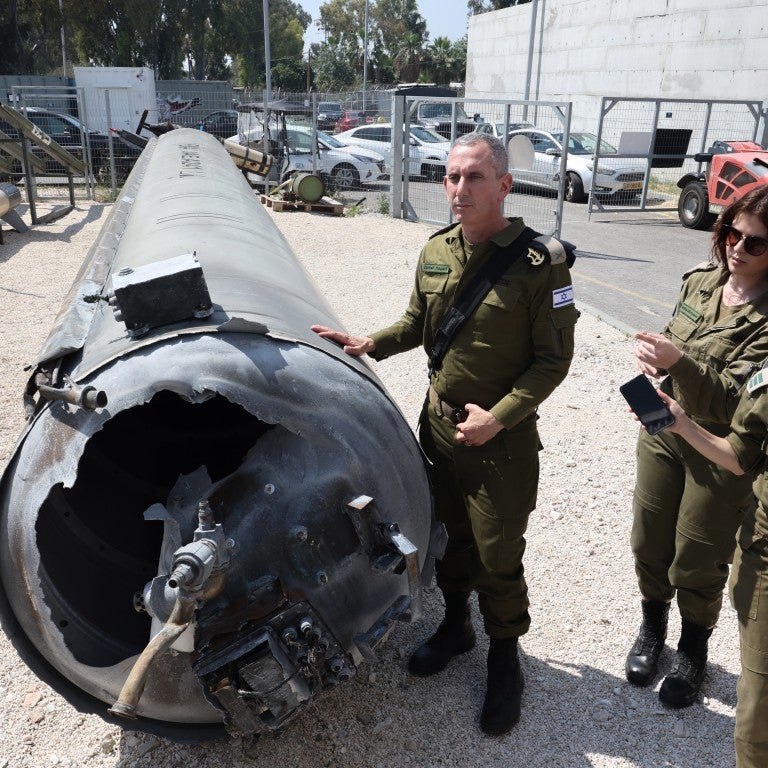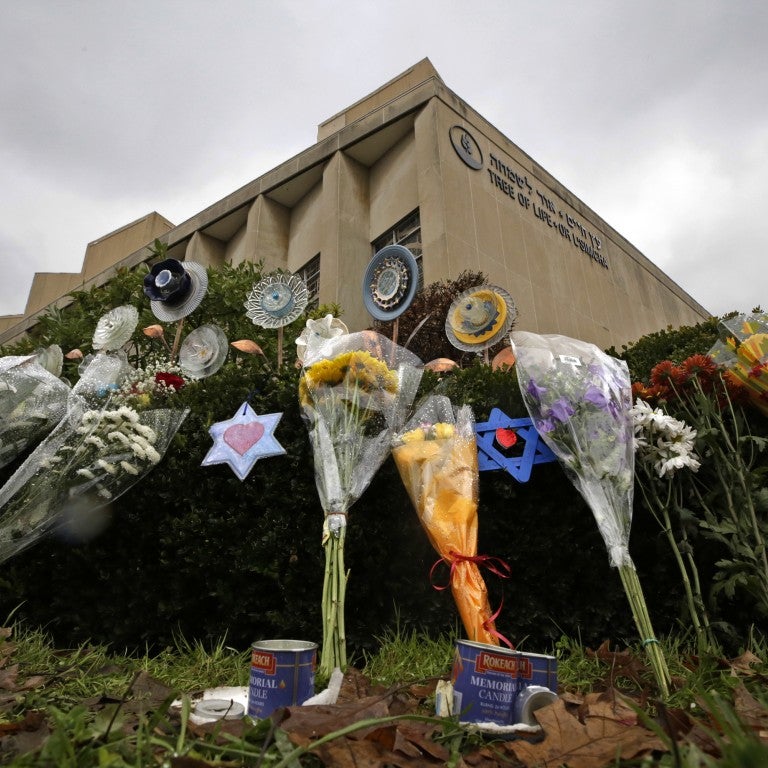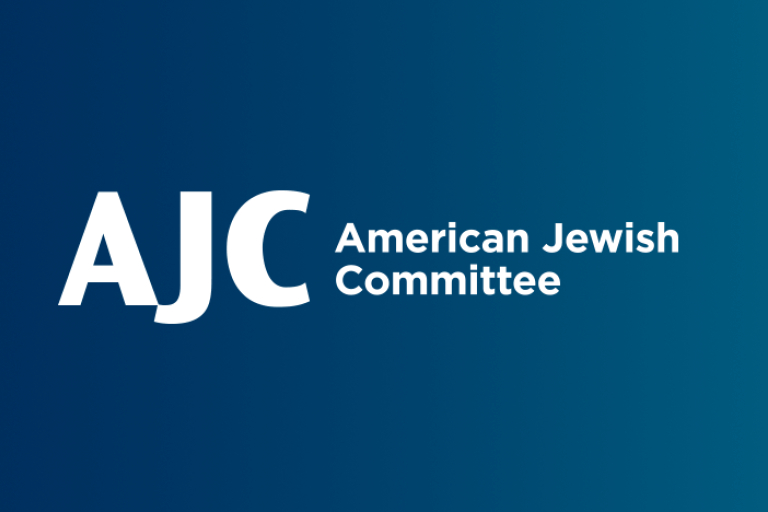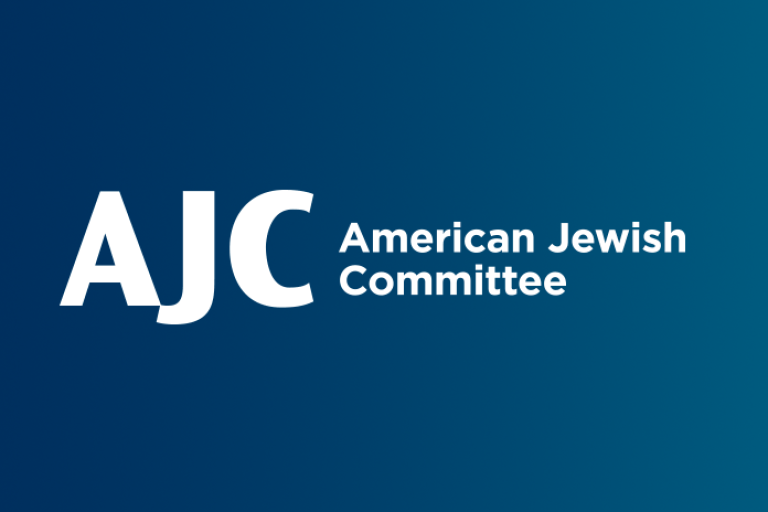April 16, 2024
Israeli-American Comedian Modi Rosenfeld, who took part in the inaugural AJC’s Voices Against Antisemitism Campaign, just-released a stand-up comedy special, Know Your Audience, which reflects a principle he has always subscribed to. But what happens when you know your audience is suffering a trauma like no other? Listen to this conversation with Modi, who was in Israel on October 7, on how he jokes about antisemitism and what he sees as his mission in this difficult moment: helping the Jewish community laugh again.
*The views and opinions expressed by guests do not necessarily reflect the views or position of AJC.
Episode Lineup:
- (0:40) Modi Rosenfeld
Show Notes:
Learn more:
- AJC's Voices Against Antisemitism: Meet the Celebrities Standing Up for the Jewish People and Israel
- modilive.com
Photo Credits:
- John Cafaro
Credits – Standup Clips:
Listen – People of the Pod on the Israel-Hamas War:
- A Look Back: AJC’s Award-Winning “Remembering Pittsburgh” Series
- Jewish College Student Leaders Share Their Blueprint for Combating Antisemitism
- Matisyahu’s Message to His Fellow Jews and to the Israel Haters Trying to Cancel Him
- Unheard, Until Now: How Israeli Women Are Powering Israel’s Resilience
Follow People of the Pod on your favorite podcast app, and learn more at AJC.org/PeopleofthePod
You can reach us at: peopleofthepod@ajc.org
If you’ve appreciated this episode, please be sure to tell your friends, and rate and review us on Apple Podcasts.
Episode Transcript:
Manya Brachear Pashman:
Comedian Modi Rosenfeld, known by his fans as simply Modi, is nearing the end of a live national tour, co-hosts his own podcast, and he recently released his first televised stand-up comedy special titled Know Your Audience. It’s a principle the Israeli-American comedian has always subscribed to. But what happens when you know your audience is suffering a trauma like no other. Here with us to talk about how we can and why we should laugh again is Modi Rosenfeld.
Modi, welcome to People of the Pod.
Modi:
Hi, People of the Pod.
Manya Brachear Pashman:
You were born in Tel Aviv and grew up on Long Island. Tell us how you found your way to comedy.
Modi:
I was actually just doing investment banking. And I used to imitate the secretaries. And my friends said this is really funny, you should do it on stage. And they set up an open mic night. And that was about 30 something years ago. And that's how the comedy began.
Manya Brachear Pashman:
The special that I mentioned was filmed nearly a year ago. It was filmed before the Hamas terrorist attack and the war. You talk about COVID, you talk about marrying your millennial husband, you talk about Shabbat elevators. I'm curious if you do feel like the material still resonates in the current climate?
Modi:
Ever since October 7, I've been doing my shows and not mentioning the war itself. Until the very end where I sing Hatikva with the audience. I feel like the audience needs a moment to just laugh and not think about the war. And not think about what's happening in Israel and just have a laugh about being Jewish, being Jewish, about non-Jewish people.
Sometimes I tell the story about how I was October 7, while I was in Israel. And then sing Hatikva with the audience, people seem to, they're very touched and moved by it. And it reminds them, now, let's just remember where our hearts and where our prayers and where our thoughts are.
Manya Brachear Pashman:
So let's talk about where you were on October 7.
Modi:
The war began at the end of the holiday of Sukkot and I was in Israel. I had six shows, sold out shows in Israel that were absolutely amazing. One of the highlights of my career. Thursday was the last show. Friday we were there for Shabbat and Saturday we were scheduled to fly out to Paris to do four shows there. And obviously Saturday morning, the alarms went off and the bombs went off.
We were staying at the Setai Hotel, which is in Yafo, the Arab part of Tel Aviv. Bruno Mars was also staying at the hotel. He had three concerts in Israel and at 12 in the afternoon we saw them whisk him away to a private airplane to be taken out of Israel.
And I said to Leo, my husband, I said Thank God they got put on Mars out of the hotel. He said why? I said because if a bomb hits this hotel and me and Bruno Mars die, I would get zero press coverage.
And so that was you know, something light in the day, but it was a very, very stressful, scary day for everybody. We were on a scheduled flight to go to Paris. And it had a four hour delay. And we finally took off and got to Paris. And then we had to make a decision. Do we do these shows? Because the war was so fresh, people were just learning about what's happening and watching it on their phones. But the sold out shows were full. And that's when I began to do Hatikvah at the end of the shows, and I've been doing it ever since.
You know, we just had an hour and 20 minutes of laughter, they just had the best time. We were all laughing. And then you just focus again, you know, yeah, we're laughing. But in Israel, there's a whole different experience happening. And even though in Israel now, the comedians there are also performing and doing shows. You've got to find a respite from being in the war.
Because we are, you know, everybody's on their phones, you’re 24 hours in the war, receiving news and footage and all kinds of information. And then you finally get to just take a few minutes to laugh.
Manya Brachear Pashman:
When you said that you were actually an investment banker, that you found comedy kind of as a career later on, but what role did humor and comedy play in your upbringing, in your family life, your childhood?
Modi:
Only later on in life that I realized that my father more than all is a very funny person, just by having no editing skills. I never was a class clown. I was always funny with friends, but you know, when you're a table comic, and you're a real comic it’s two different things.
If you can be funny with your friends at a table, you know your audience, you know everybody at the table, you know what they've gone through, you know what we all know that they went through. And so it's easier to get a joke out. When you're on stage, you don't know everybody, and you don't know what they've all been through, or how they know each other.
Manya Brachear Pashman:
So how do you kind of unite your audience? How do you try to kind of find that common denominator?
Modi:
People are kind of seeing the Jewish world through my eyes, through the eyes of a Jewish person. And they learn things, even though sometimes it gets a little specific, I always translate. My goal in comedy is to make people happy, is to bring laughter into the world, which I call Moshiach Energy.
When you're standing in front of an audience of 500 to 1500 to 2000 people and you see them all laughing together. For me, that's Moshiach Energy.
How I pictured the world would be when Moshiach is here. You know, the Messianic era, just people just happy, united, laughing, not arguing. And even though you can create that for an hour and a half, you wish you could create it for 24/7.
Manya Brachear Pashman:
So how else have you adjusted your live shows to reflect the current situation in addition to adding the anthem? Do you talk about antisemitism?
Modi:
I was always talking about antisemitism, not as a lecture, not as a type of Noa Tishby, but more as a comedian. Here's what's happening, here's how it's funny. You're bringing light to it, but you’re bringing it with punch lines that are appropriate. And this was before the war, it's in my special, it’s before the war.
I don't know if you remember there was a politician in Turkey that stood up and screamed that Allah was going to kill all the Jews and destroy Israel. And then he drops, has a heart attack. I mean, the jokes sometimes just write themselves.
Manya Brachear Pashman:
A few weeks ago, we spoke with musician Matisyahu, who also has been on a national tour. He has encountered protests at most of his concerts, actually. And some concerts have even been canceled because of security concerns. Have you encountered any of that?
Modi:
In general to answer that, I would say not in the form he's had. We've had a lot of security at our shows, especially the European shows. Since the war I’ve performed in Berlin, Dusseldorf, Frankfurt, Vienna, Brussels, Amsterdam. I call it the Reparations Tour.
And we've had an enormous amount of security both from hired security and local police and guards from the city. Our last show in Paris, we had four shows in Paris, the fourth one, the police asked us to cancel because there was a huge pro-Palestinian riot across the street.
And the reason I stay riot and not protest is because it was unauthorized, and they were out of control. They had tear gas thrown in there. And that was one of the incidences.
In Brussels there was a mixup in people knowing that the security would be there. So we lost about 100 people that were going to come to the show. So the show went from 900 people to 800 people. That's the worst that's happened.
Manya Brachear Pashman:
And did you indeed cancel that fourth Paris show because of the riot?
Modi:
The Paris police were so wonderful with providing security for all the other three shows, when they asked us to cancel that show, we listened to them, and we did it. And we actually moved it to the following day to a matinee.
But they said this is not going to be a good idea for this insane amount of, that kind of protest to be–it was catty corner across from where our theater was.
It was the Republic Square, which our theater was at the Apollo, which was you can see it. And so they said it's not a good idea to have Jews walking into a theater at that moment.
Manya Brachear Pashman:
Makes sense. Was it a coincidence that it was that it was located there? Or was it connected to your show in any way?
Modi:
No, no, no–the Republic Square is, I guess, an iconic place to do something like that. My theater happened to have been across the street from it.
This was the Thursday after the Saturday, which was less than a week. Our first show in Paris was on Monday after the Saturday of the beginning of the war. So you couldn't understand how fresh this was.
All the news was coming in. Everybody was finding out exactly what was going on. We didn't have all the information, we had no idea about people that were locked in bomb shelters and people that were missing, they had no idea if they were killed or kidnapped and then just doing comedy there you know, literally I'm in the back of the theater looking at people watching their phones, trying to get information on what's happening on the war and then the lights go down and the comedy starts.
Manya Brachear Pashman:
How have you been affected by the war?
Modi:
We have family in Israel that are affected by just being in Israel and the change in their lifestyles that happened. Directly, we have family that their their kids are in Gaza. Ellie Beer from United Hatzalah is a close friend of mine, his son is fighting in Gaza. So when I speak to Ellie, I'm like, how's your kid doing?
When you're in Israel, you speak to people, it's like one degree of separation between you and anybody that's truly affected by the war.
When we did the 100th episode of my podcast at the 92nd Street Y, my podcast, which is called And Here's Modi. I'm so used to performing at fundraisers and charities where they show a movie of something horrible, and then they bring me out, and they go, and here's Modi. And here I am the Monday after the war, doing a show.
We did a Q&A with the audiences, a pre Q&A, sent questions in, and everybody kept asking who would you want as a guest on the podcast and I said, Omer Shem Tov, which is one of the hostages. His photo for some reason I see it everywhere. And I wish he could be in front of me at the podcast and not in a tunnel somewhere being held hostage.
I truly go to bed every night thinking I'm gonna wake up. When I open my phone up, it's gonna say today, all hostages were released, ceasefire has begun. And there will be an end to this soon.
Manya Brachear Pashman:
I think that that is what we all pray for, and hope to wake up to every morning. I’m curious if you've returned to Israel since October 7, I know you've been on tour, traveling a lot, but have you had a chance?
Modi:
I have been in every Jewish community from California to Florida to New York to Chicago to everywhere, with the tour. And again, it's, I think, for me, that's more important than being in Israel, because I'm connecting with these communities who are not in Israel, and bringing them a little bit of unity.
The community gets together, you see people –for some reason, all our shows are starting a little late, everybody just sees each other in the lobby and like, Hi, how are you? Good to see you. And then they come into the show.
I think that's more important for me to be doing that than running around Israel, saying how ridiculous this war is. Everybody's doing what they can do. And I'll be in Israel in June, and I'll be doing a show in Yerushalayim, and then I'll be back there in September doing a larger show in Tel Aviv and doing whatever I can do to help there.
Manya Brachear Pashman:
You often interact with audience members in your show. Have you had any interesting encounters with individuals in your audience? Especially since October 7?
Modi:
I'm not one of those comics who does the where are you from, what do you do and make a whole hour about trying to get something funny out of that. That's totally not my style. I do ask if anybody's not Jewish and this way I know–if you see my comedy special you see there's an extra layer of the joke. Me translating it to the person who's not Jewish.
I will tell you in that aspect, beautiful things have happened. People who are let's say in an intermarriage or even converted to Judaism come up to me afterwards and say, Wow, I never felt so welcomed and accepted and feel a part of the tribe and they tell me their story about how they ended up in the Jewish world.
Like my husband, who was born Catholic. And now he is coordinating with your organization, with every other UJA, JJJ, JJC, JJABC, JABC JJBC. You know, and he is on the phone speaking to people about a motzei shabbos show, a pre-shabbos show, after yuntif, before yuntif.
He's coordinating with the Jewish world to make sure that they're laughing. And it's an amazing– that's one of the nicest things that I've been seeing. People who ended up in the Jewish community that weren't Jewish, feel so welcome from the show.
Manya Brachear Pashman:
What makes you proud to be Jewish, Modi?
Modi:
What makes me proud to be Jewish is, I just think that the contribution of Jews to the world is significantly larger than the size of the people that we are. And I talk about that now in the new part of my show, you know, how just everywhere you go, whether something to do with medicine, education, culture, there's always a Jewish name on the building. A part of being Jewish is not only helping the Jews in the community, it's helping the community. So not just creating something–the Lubavitcher Rebbe always spoke about that, whatever you are in the community, don't just help the Jews there, help the community in general.
And you see that, you know. You go to any hospital, any museum, and you just see the Goldberg Pavilion, you see the Horowitz Wing, and they just give and help create all of that. In comparison to the size that we are in the world, we do a lot more. And something, that makes me proud.
Manya Brachear Pashman:
I think that you're absolutely right. And I think that your contribution of comedy and humor, and laughter, especially at a time like this is really so appreciated.
Modi:
You can bring humor into the world by, I always say: be the friend that brings their friends to the comedy show. If you see me coming to a theater near you, another comedian, coming to a theater, buy a few tickets. By the time the comic gets there, you'll see how all your friends are looking for tickets, and they're gonna want to have a good night of laughter.
And now you can just make a night at your house, you can put my special on the TV and have a bunch of friends watching and make an evening of it, and make sure to send it and make sure that people who can't get to a show like the elderly and your parents, grandparents that don't have a way to get to a show or don't know how to set up Amazon or go to my website, help them, sit with them. Watch the comedy show with them. That's Moshiach energy.
Manya Brachear Pashman:
Well, thank you so much, Modi.
Modi:
Thank you.
Manya Brachear Pashman:
Last week, we re-aired excerpts from our award-winning series Remembering Pittsburgh, which marked five years since the 2018 shooting at the Tree of Life synagogue.
Next week, one of the guests in that series returns. Marnie Fienberg founded 2ForSeder, an initiative to honor her mother-in-law Joyce who was one of the 11 victims murdered inside Tree of Life.
Ahead of Passover, Marnie will share how inviting newcomers to our Seder table can be a powerful way to push back against antisemitism.
